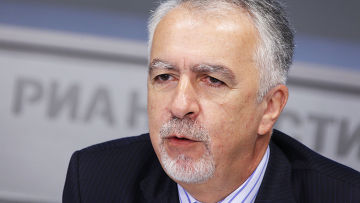
Yevgeny Savostyanov
Deputy Chairman, Center for US – Russia Rapprochement
Say, a young hooligan is kicking up a row, and three big guys are passively looking on as his pranks are getting increasingly dangerous.This kind of analogy comes to mind as one watches North Korean leader acting up and the world community responding to that. On the whole, this reaction appears reasonable and justified; no one overrates the chances of North Korea's abuse and threats morphing into real aggression.
Still, responsible leaders, and the top military command above all, should always plan for the worst-case scenario. In this case they should be fully prepared for possible full-scale warfare in the region.
That is a highly unpleasant prospect. However, chances for acquiring some positive experience in the great powers' mutual relations in this predicament need not be ignored, either.
What I have in mind here is the possibility and expediency of setting up a provisional united operational HQ of armed forces representatives from Russia, the United States and China.
The main task of such an HQ would be coordinating actions by the three countries in handling the missile threat from North Korea, preventing incidents involving their own armed forces, and taking measures in the civil defense area.
This kind of move would entail the following obvious benefits:
(a) it would be possible to specify the responsibility areas of each party, the procedure of using forces and means in each party's responsibility area, and measures taken by friendly forces in the event of crisis areas. Also, that would make it possible to minimize interference in other parties' activities, prevent potential destruction by friendly fire, make interception of real targets more efficient, and improve cooperation between rescue and civil defense forces;
(b) a coordinated position of the great powers could help cool down passions and subsequently become an assured guarantee of non-use of force in the region, its denuclearization and demilitarization;
(c) such an initiative on Russia's part would help consolidate the spirit of trust and improve bilateral relations, also enhancing Russia's international standing;
(d) this type of experience could be used to stabilize the situation in other parts of the world as well.
This tri-partite format of joint action seems truly the best, since it rules out any implication of the proceedings being aimed against one of the sides of the big triangle.
However, a bilateral initiative is also possible, although not quite so desirable, if it turns out that one of the parties is putting forward conditions unacceptable to the others, or takes much too long to make up its mind.
Photo - RIA Novosti



_jpg/250px-ElbeDay1945_(NARA_ww2-121).jpg)







